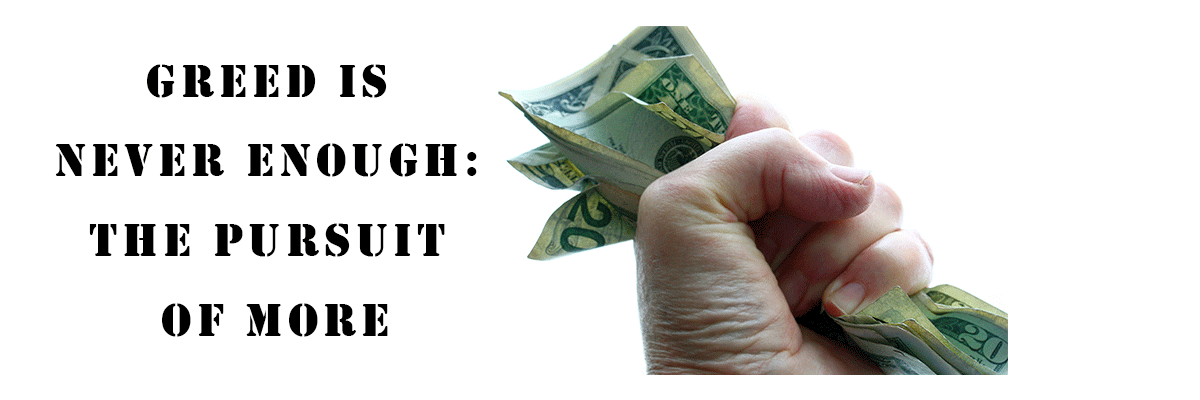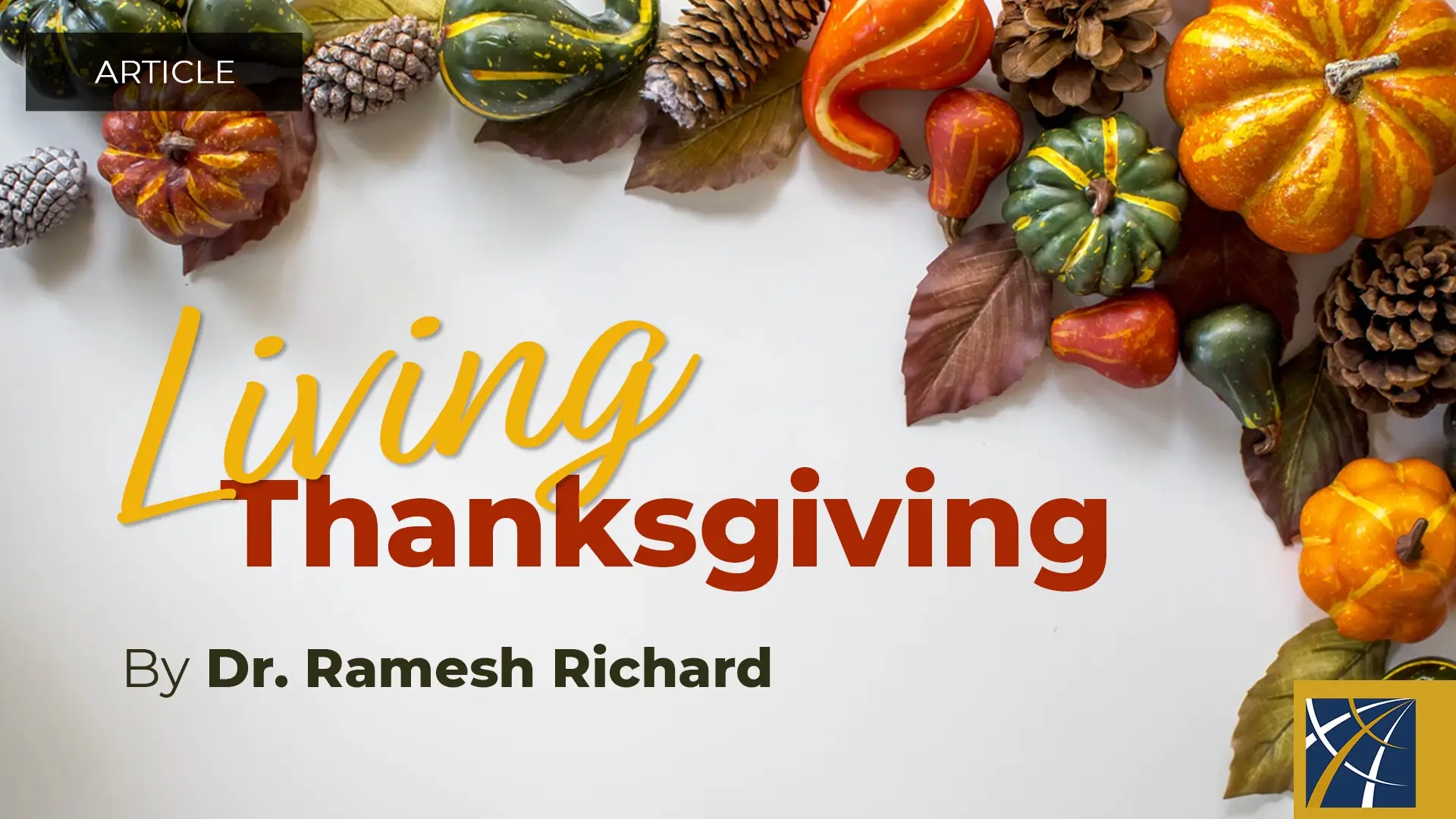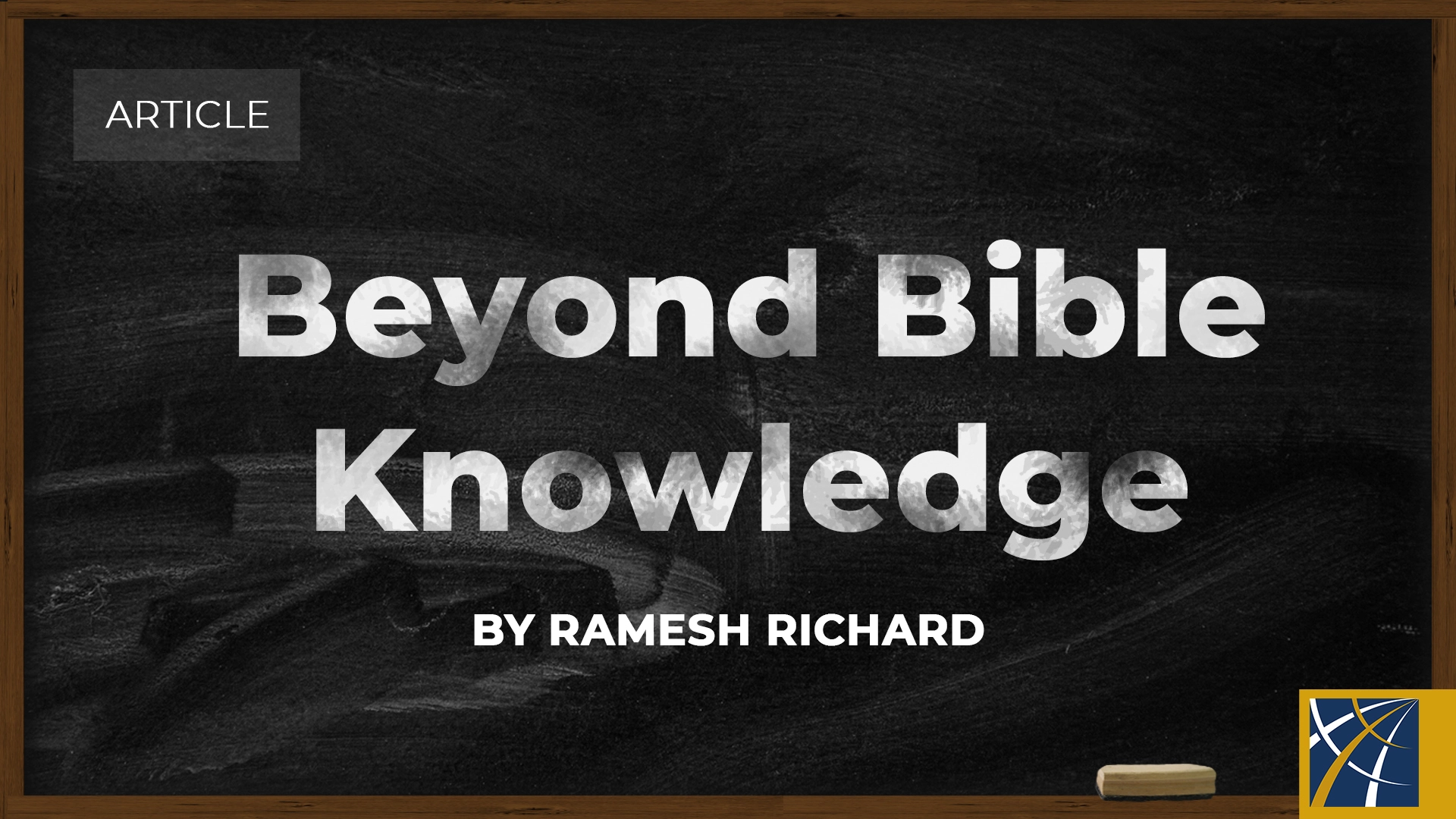by Ramesh Richard
“Riches are not forbidden, but the price of them is.”
St. John Chrysostom
Article Summary: Greed is native to human hearts—a reality easily
confirmed by psychology, philosophy, and sociology. After it is detected,
it must be drained. And only theology—the God who is foreign to sinful
hearts can provide the resources of grace to drain greed of its personal and
social consequences. This seven page article ends with perspectives and
practices to help loosen the grip of greed in our lives. Questions for
reflection and application are found in the appendix.
The enormous psychological and social toll, in addition to the economic and governance implications, of one man’s making off with $65,000 million or more is nearly incalculable. Unfortunately (or is it fortunately?) there is no sure quantifiable calculus to measuring the intangible dimensions of pain experienced by human beings. As of this writing (Q1, 2009), four prominent suicides across the continent and the Atlantic make headline news—at least one directly related to history’s largest Ponzi scheme. Another, among the top 100 of the wealthiest in the world, threw himself on a train track. His billions didn’t keep him from self-defeat.
We had thought that greed was primarily ensconced in religion—witness religious hucksters found in every religion. They rob the poor in order to enrich themselves. However, politics, in graft and bribe, will never be freed from greed. Even the bowels of altruistically formed non-governmental organizations are not entirely innocent. Testimonies of greed in the worlds of art and culture, business and education are found everywhere, every day. It is almost like human beings are hard-wired for greed, and rationally able to justify it’s inherent, pragmatic benefits for the sake of economic momentum.
The definition of greed as “never enough” points to a very human condition. Part of our humanity is the drive to strive for more, whether more of good, neutral, or bad. Restless humans, pursuing their hierarchy of needs, with basic needs already fully in their grip, grasp for more, grope for more of the material. That restless quest describes the human condition.
The psychology of greed is established by research. Making more money stimulates the same neuro-transmitters that, for example, “victimize” drug addicts. There’s also the psychological need to project a certain image—even to those whom we don’t personally know. Since we influence other’s responses to us with external impressions, we sense a need to feel better about ourselves, by how others feel about us. And even without reference to others, there is high self esteem and deep self-value found in acquiring more.
The philosophy of greed is subtle, but wisdom emerges with some intellectual stoking. We would ask what constitutes your understanding of “well-being”? Not well-feeling (that’s psychology), but well-being? A wrong concept of well-being leads to wrong ways of finding it! In fact, we are caught in a prison situation: greed for well-being stimulates greed. Further, the opposite of greed, i.e., moderation, smacks of low-octane living. Without the senses constantly stimulated, minds distracted, and hearts divided, we sense a lack of energy in life. Some think greed in itself defines well-being, so they become more greedy for well-being, when well-being in itself means will be empty of greed. At some point, irrationality takes over, confusing moral decisions. Greed can enable philosophical justification of fraud, all in the name of averting financial loss.
The sociology of greed detects layers of relational complexity. To start with, no one wants to feel left out of being viewed as successful. At complex levels, greed revels at other’s predicaments, especially competitor’s troubles: no compassion is to be extended to those who “deserved” their plight. Standard sociological assumptions foster a group greed-mentality. We feed each other into a frenzy of group acquisition and then are willing to lose it together. In the meanwhile, our fear of passing judgments on group behavior, keeps us from using social judgment at all. A democratic view of money confirms that greed will always be with us, in all our hearts. Such a cumulative aggregate, a social reality, makes it morally right, cause-oriented pursuit. Often, we provide space for the rich to be different from the rest of us, to live by different rules and modes of thought and behavior. Greed stratifies those who’ve accomplished wealth with self-excepting rationalizations of immoral means to gain it.
It’s at the theology of greed, what God thinks about greed, that greed runs into its deepest challenges. The current economic crisis launched a greed-rethink, even questioning capitalism at its core. To counter a superstitious “invisible hand” guiding free-market capitalism, one economist writes, “the visible hand of good governance” is needed. In an atmosphere of rethinking the pervasive greed-contagion, may I suggest that the “good” in good governance begins with what the Ultimate Good Governor thinks about greed?
First Timothy 6:9-10 read, “People who want to be rich fall into temptation and are trapped by many senseless and harmful desires that plunge people into ruin and destruction. For the love of money is a root of all kinds of evil, and in their eagerness to be rich some have wandered away from the faith and pierced themselves with many pains” (1 Timothy 6:9-10).
I point you to four conceptual couplets presented by the apostle Paul in those two verses. He warns those who are driven by the goal of wealth about the consequences of greed (1 Tim. 6:9-10). They make money for the sake of making money. Energized by the money-driven life, they love money. They are consumed by an “eagerness to be rich.”
1. The greedy stumble into a temptation and a trap. They experience a set of temptations not faced by the non-greedy. They become trapped, caught, imprisoned.
2. The greedy are trapped by senseless and harmful desires. These desires are unique to the greedy. They exhibit distinctive senselessness, unable to extricate themselves from harmful desires. Their stupidity lies in thinking beneficially about harm.
3. The desires of the greedy plunge them into ruin and destruction. Their greed sinks them into ruinous waters and holds them under as they gasp for breath. They waste their efforts and squander their lives.
4. When believers love money, they wander away from the faith and pierce themselves with much pain. Actually, when they are not faithful to God’s view of money, they will have good reasons not to be faithful to the faith, as good as the pragmatic excuse to lust after money.
Looking at Paul’s caution, greed should be drained from your heart, as soon as you detect it in your life. Here are some ways to weed out greed, so your greed doesn’t cause you and others to bleed:
1. Spiritual conviction weakens greed of its strength in our lives. “Greed” declares, Paul, is “idolatry,” in the strongest condemnation of any sin (cf. Col. 3:5). My heart (and yours too) loves to manufacture idols, even out of good objects, relationships, and aspirations. Idolatry is the highest of sins, because it diminishes the exclusivity of God. As idolatry, greed attempts makes to make bad good, the unholy holy, idols into God, and thereby breaks the First of all commandments. Greed competes for equal claim on the human heart, the right to our obedience and confidence. But God doesn’t brook rivals, for in reality there is no equal to him. If you are against idolatry in all its forms, you would be opposed to greed. But when you are greedy, you are an idolater (Ep. 5:5).
In an obverse way, when we are greedy, we debunk God of His very character as our creator and care-taker. We take the ultimate humanistic hubristic stance when we are greedy—our trust and confidence is in ourselves as own protectors and providers. Greed diminishes who God is and is to be in our lives.
2. Generous Giving: “Giving is the drain plug of greed,” my mentor, my late mentor, Fred Smith, said. Paul continues in the chapter, the currently rich (that’s you and me), “are to do good, to be rich in good works, generous, and ready to share” (1 Tim. 6:18a). Of course, you don’t give in order to further justify your greedy heart-habits, but cheerful, sacrificial, regular and proportionate giving to God will keep your mind alert to your heart of greed. In this way you will lay up treasures toward heaven and are “rich toward God” or else you will be a fool (Lk 12:20-21). Income decrease ought to be reflected in lifestyle
decrease, but income increase doesn’t need to be paralleled by life-style increase. It can result in increased generosity. Of course, you don’t give to feel better about yourself, or superior to others, you give so you can drain greed from your life. Start at a percentage, stay with it, raise it, even during times of portfolio loss. If you want to be rich in any way, be rich in good works and generous giving. Why should your potential beneficiaries just because you expect or experience the effects of a market slow-down? How about making your giving (from current income, at least), your largest on-going expense?
3. Eternal Perspective uproots greed from acquisitive urgency. Paul also cautions the rich “not to be haughty, or to set their hopes on the uncertainty of riches” (1 Tim. 6:17). There is a present age and a future age. The latter is eternal, the present temporary. If God has blessed you with riches, enjoy its benefits now (v. 17b), but beware of the tendency to haughtiness, a superiority over others, and a sufficiency in ourselves. As most wealthy people have found out in this present age, wealth is transient. Everything, even what God gives us to enjoy (v. 17c) must be left behind. Since the eternal is more important than the temporal, generous givers store up “for themselves the treasure of a good foundation for the future, so that they may take hold of the life that really is life” (v. 18b). If your present foundations are shaking, then we better secure our future foundation. And when our future foundations are secure—one of the reasons for greed is future security—we can live life in the present with great passion. We can really take hold of life that really is life, deep and sound enjoyment of a joyful and happy life. We won’t be falling into ruin and destruction, tempted and trapped into senseless and harmful desires, wandering away from the faith, with self-inflicted sorrows. “Money is a curse in my life,” notes a rich friend, “almost every problem in my life, relates to money” but it’s allure keeps me pursuing it. This self-awareness may be the first step in gaining perspective on the role, function, value, and promise of money in one’s life. We shall not “set our hopes” on wealth. Actually, during this economic dislocation, the believing rich can “boast” if brought low, because they know that like a frail flower under a scorching sun, “in the middle of a busy life, they will wither away” (Jas. 1:9-11). Only an eternal perspective keeps the believing rich from despair.
4. Material Contentment wears out greed in your life, as you put ungodly desires to death (Col. 3:5) and to focus on what is above and invisible (Col. 3:1-2). As strong as the condemnation of idolatry, is the tough invitation to kill greed in our lives. Unfortunately many think contentment is the same as passivity, and fall into materialism, as an economic and religious philosophy of life. The belly-god becomes their heart-God (Phil. 3:19), torn by serving both God and mammon (Matt. 6:24; cf. Luke 16:13). Instead, place contentment (along with hospitality and generosity) among the strongest of Christian virtues. For when you already have much, and want to pursue more it takes greater strength to be content, than to buy the next shirt, shoes, gadget, car, painting, boat, house, etc.. Which do you think needs more active, internal fortitude—buying or not buying what I could afford and wanted? Do you think it was easy or difficult for the “big-barn-builder” to assume longevity and plan on bigger barn building (Lk. 12:16-18)? Material contentment would have brought some practical sense about the transience of his life and his crops, if he had intentionally considered the options. Or what about, Achan (Josh. 7:21)? Greed made it easy to covet forbidden possession. Contentment, when you are rich and faced with options to impulsively indulge, is hardly passive!
To seek God’s kingdom first, his righteousness and priorities (Matt. 6:33), takes active contentment with what you have on earth, and active pursuit of what really lasts into heaven. One way you can know that you are seeking God’s kingdom is by laying up treasures in heaven (Matt. 6:19) when you can spend it
right now on what you want. Whenever you want more, ask for what? For enjoyment, and perhaps, convenience? Or to make a statement to others, or even to one’s self?
5. Intentional gratitude depletes greed of its power. Since thanksgiving is a powerful emotion, it’s best that we count our blessings year round (not just on an authorized holiday), regardless of circumstance. Look at yourself today—are you alive, awake, alert, and active? Then be grateful for the day. You’ll get to look at tomorrow as today, tomorrow. Look around you. All of us have more than our neighbors, near and far. Intentional prayerful thanksgiving generates joy and reduces the consumerist spirit. Paul wants us to navigate between setting our hope on the uncertainty of riches and setting our hope on God who gives us all things for our enjoyment. The former hope is false and worrisome. I have found an inverse relationship between thanksgiving and envious anxiety. One dislodges the other. Instead, God is worthy of our hope, and we are filled with thanksgiving as we enjoy his gifts. Prayerful gratitude to God is a mature faith, thanking God for the present and trusting God for the future. Further, public thanksgiving infects those who are discouraged or depressed with a new enthusiasm for life.
6. Hard work without an eager eye towards outrageous remuneration exhausts greed of its motivation. The genius of economic systems that abundantly rewards hard work skews our heart toward making the benefits of financial reward the reason for useful work. We begin to think we can create money since the invisible hand is there to remunerate our efforts. I have also experienced the frustrating reality of people in places where monetary rewards don’t have an outlet for expense! If good reward can be viewed as the result of hard work (one of the reasons some economic environments are systemically better than others) rather than its purpose, you’ll be far more prone to be less satisfied with your lot in life. You will work hard and honestly for the sake of calling, of duty, of ministry. There will be joy in a job well done, effectively executed, with good financial remuneration topping off the efforts. Work, then can be sacred without regard to financial reward or economic system, and allows for human value and dignity to not be measured quantitatively. Some are simply overpaid, aren’t they? :-)
7. Righteous aspiration effectively counters ungodly desire in our lives. First, righteous aspiration for God Himself—the real, full, and right content for the spiritual hole-in-our-souls. Second, righteous aspiration places fences, not around ambition, but selfish ambition. We keep away from speculation, especially speculating with other’s money. We examine the righteous quality of the metrics we use to quantify success. Making more money does not become adequate justification for making more money. Righteous reasons to make money include the good use of talent, skill, calling, and optimism of effort. Also, the righteousness of aspiration keeps us from breaking God’s rules in order to gain more.
After all, the critical difference between greed and desire is internally located. If the motive for wanting more is self-based security, trust, confidence, pride, significance, status, and self-value, then we have fallen into unrighteousness. However, if you want more in order to serve others; to be more just and generous; to not oppress the poor (as James warns, 5:1-6); to give back to a society that has been good to you, you are on the right track. Giving back and investing in the health of an economic system in order to perpetuate wealth so more people, now and across generations, can be helped even more, allows every
one in a democracy to participate as benevolent servant-kings. For we do believe in an invisible guiding hand, who creates realities for us to seize, and enables us to intentionally live life to the fullest, to His glory. Any investment in ourselves as a means to fulfilling God’s will, keeps self-interest from becoming selfish interest,1 with ourselves being the objects and ends of our existence.
While greed is the human condition, it does not need to be the human definition. Greed takes what is economic reality (money—a notional concept with endowed meaning) and turns it into an existential right. Instead if self interest relates to personal enjoyment without prideful reference to any one else, is undertaken within ethical and moral boundaries, and accompanied by sacrificial giving as part of the life-style, you are increasingly being saved from greed. And even if you occasionally succumb to the sinful hard-wiring, by God’s grace, you can overcome it with industry, thrift, and generosity—those oldfashioned virtues that mark those freed from greed.
Finally, a righteous aspiration to be used more by God often brings more resources and responsibilities from him! Whoever is faithful in little, notes Jesus’ parable of the talents, receives more to do more. Whoever scatters the seed, says Paul is replenished to scatter more (2 Cor. 9:6-12). That is, if more wealth is to be used, to generate more wealth in order to be rich toward God and neighbor, by all means aspire for more. While greed is idolatry, desire is not, unless it descends into greed or ascends into service. Make (save, give,) all the money you can, but, a friend says about hoarding, “do not sit on the Can!” Work for more, but live for God. However, if wealth is the means by which you secure your future, retain your status, reinforce your self-identity, and feel superior, then beware of the idolatry of greed.
Greed is never enough, by metaphorical definition. An early Christian preacher (Basil the Great) on his sermon to the rich, noted the parallel between greed and hell, “Hell never says enough is enough; neither does greed say enough.” Nothing will never ever be enough—the literal nature of greed.
Since our entire world is not enough even for one person, even insatiable greed is a pointer to the One who is enough. God alone, by definition and nature is enough for the human soul—each of us, and all of us, across history and geography. Since we reap what we sow, only God can alter that law of the harvest. That He does in the Lord Jesus Christ, who personally reaped what we sinfully sow, and now extends the power to overcome greed by grace. “For the grace of God has appeared, bringing salvation to all, training us to renounce impiety and worldly passions (i.e., greed and its consequents), and in the present age to live lives that are self-controlled, upright, and godly” (Ti. 2:13). Grace drains ravenous greed and trains that vigorous force into a circumstantially-free, hard pursuit of the all-sufficient God and His Vision for us.
______________________________________________________________________
1 The desire to abolish desire mixes the psychological self with the egotistical self. Denying selfinterest is impossibly inescapable, for there has to be a “self” to deny any self-interest. In its place, the Bible affirms the psychological reality of the self, and calls this psychological “I” to deny the egotistical “I” (Mark 8:34), to make it one’s self-interest to place other’s interests above our own self-interests (Phil. 2:4). That is to deny selfish-interest which creeps into self-interest.
Greed, Money and Success
Open Ended Prompts for Personal Reflection compiled by Ramesh Richard
in conversation with Fred Smith Sr.
1] What options does my money afford me and how do I decide which ones to take?
2] How has affluence affected my family?
3] Does my money control my lifestyle or does my lifestyle remain outside the control of money? And how do I make that decision?
4] How do I come to the conclusion that I have been successful?
5] Does my wealth develop arrogance in relation to people? Do I see the rich as a different class of people? Do I spend time with the rich just because they are rich?
6] As wealth accumulates, does it lead me to give or stockpile? Do I give as I accumulate or wait to reach certain goals before I give?
7] What privileges do I expect as a rich person? How do I use my money for power or preference?
8] How would I relate to people if I lost my money?
9] When options are given to me, is it because of who I am or is it because of my wealth? Why?
10] How do I measure significance and how am I attempting to achieving significance?
11] Is the basis of my success something I have achieved or something that has been received? What difference does a biblical attitude on this question make in our life?






